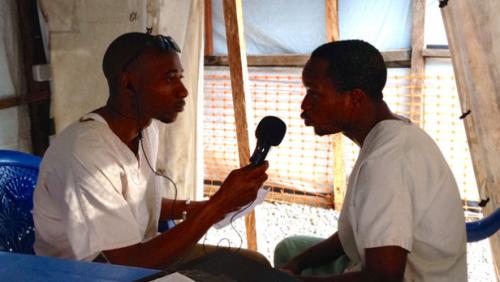DEVEX byAlison Campbell April 23, 2015
The Ebola crisis in West Africa was quickly recognized as being driven as much by misinformation and rumors as by weaknesses in the health care system.  Mohamed Komah interviews an Ebola survivor at the Donka Ebola treatment center in Conakry, Guinea. Photo by: Internews
Mohamed Komah interviews an Ebola survivor at the Donka Ebola treatment center in Conakry, Guinea. Photo by: Internews
International response agencies invested significant resources in rolling out the Social Mobilization and Community Engagement drive, a wide-scale intensive social behavior change communication campaign. The result was a massive and rather poorly coordinated blast of messaging shared on billboards, in print, on radio and TV, through health outreach workers and community organizations, via SMS and call-in hotlines.
A preliminary assessment done by Internews in November found more than 300 types of social mobilization and messaging systems in the three worst-affected countries: Liberia, Guinea and Sierra Leone. This chaotic information landscape consisted mainly of information “out,” with little opportunity for community dialogue....
Recent Comments